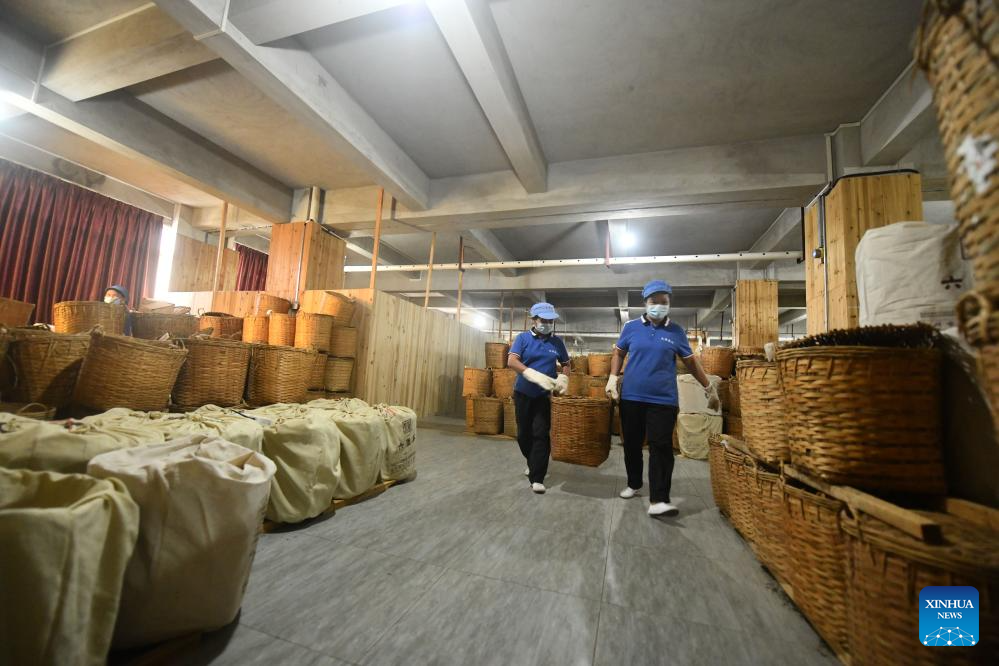
Workers store tea at a company in Wuzhou, south China's Guangxi Zhuang Autonomous Region, Oct. 25, 2024. Liubao tea, a Chinese dark tea characterized by its strong and lingering fragrance and medical effects, boasts a history of more than 1,500 years.
Famous for Liubao tea making, the city of Wuzhou has over 400,050 mu (about 26,670 hectares) of tea plantations, with an output value exceeding 20 billion yuan (about 2.8 billion dollars). (Xinhua/Huang Xiaobang)
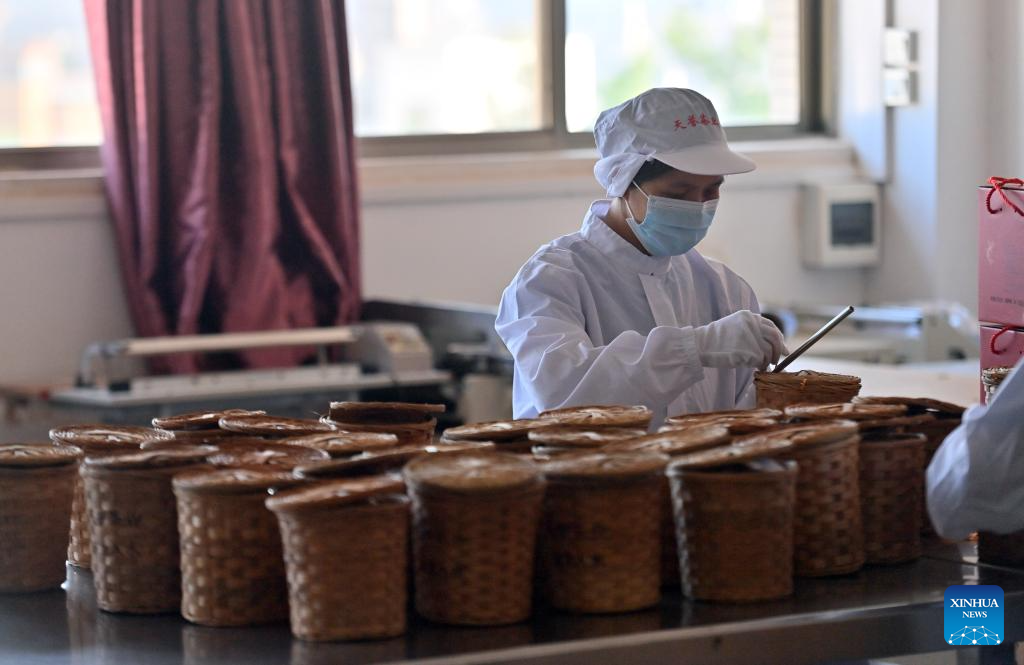
A worker packs Liubao tea at a company in Wuzhou, south China's Guangxi Zhuang Autonomous Region, Oct. 8, 2024. Liubao tea, a Chinese dark tea characterized by its strong and lingering fragrance and medical effects, boasts a history of more than 1,500 years.
Famous for Liubao tea making, the city of Wuzhou has over 400,050 mu (about 26,670 hectares) of tea plantations, with an output value exceeding 20 billion yuan (about 2.8 billion dollars). (Xinhua/Huang Xiaobang)
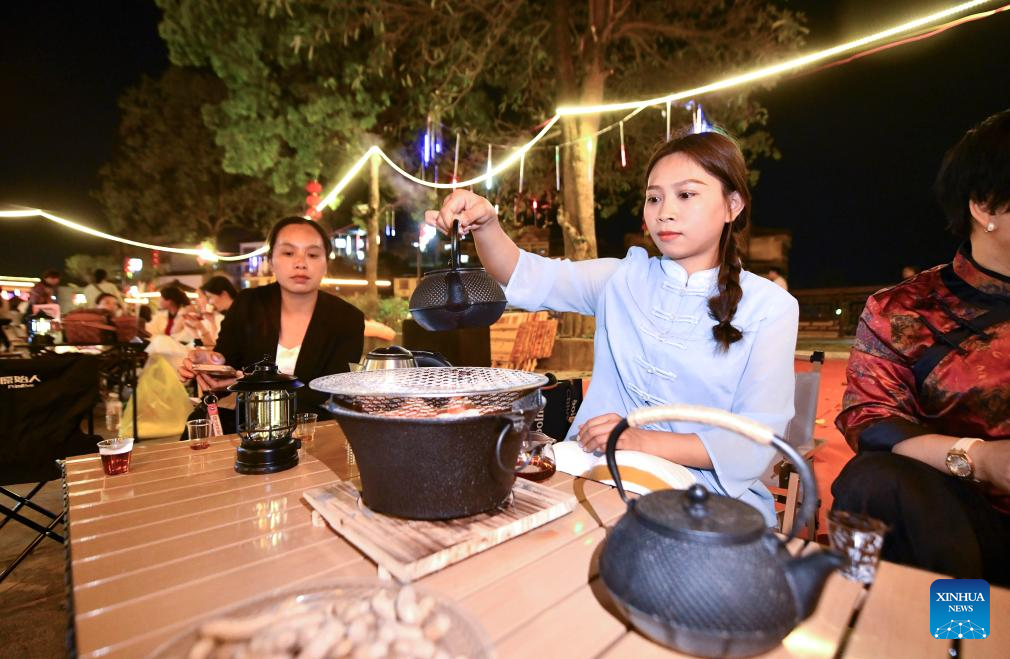
Tourists and local residents prepare to taste tea in Liubao township, in Cangwu county of Wuzhou, south China's Guangxi Zhuang Autonomous Region, March 25, 2024. Liubao tea, a Chinese dark tea characterized by its strong and lingering fragrance and medical effects, boasts a history of more than 1,500 years.
Famous for Liubao tea making, the city of Wuzhou has over 400,050 mu (about 26,670 hectares) of tea plantations, with an output value exceeding 20 billion yuan (about 2.8 billion dollars). (Xinhua/Huang Xiaobang)
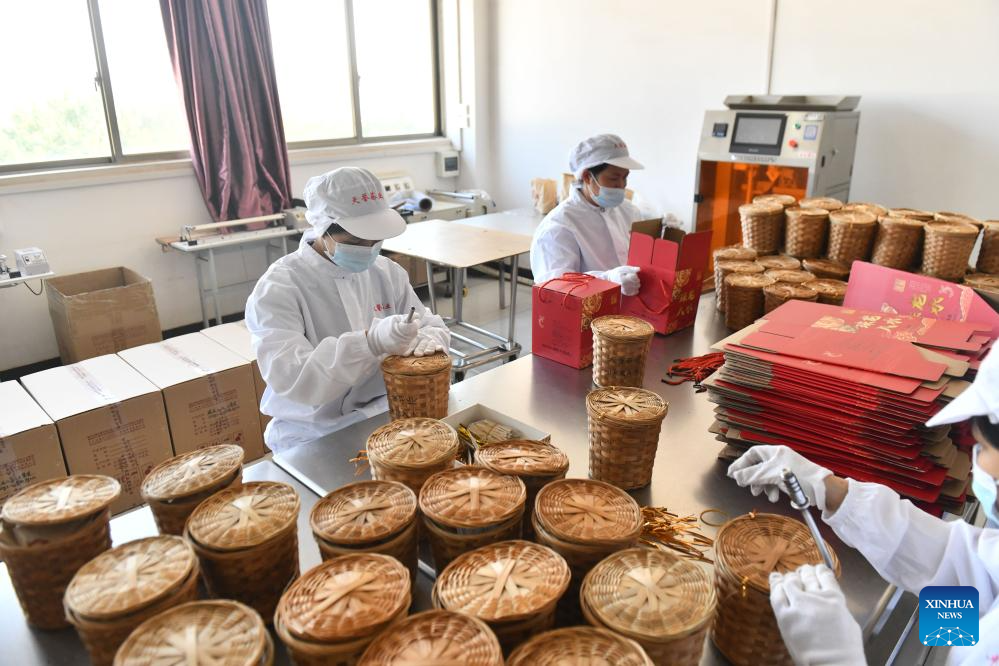
Workers pack tea at a company in Wuzhou, south China's Guangxi Zhuang Autonomous Region, Oct. 8, 2024. Liubao tea, a Chinese dark tea characterized by its strong and lingering fragrance and medical effects, boasts a history of more than 1,500 years.
Famous for Liubao tea making, the city of Wuzhou has over 400,050 mu (about 26,670 hectares) of tea plantations, with an output value exceeding 20 billion yuan (about 2.8 billion dollars). (Xinhua/Huang Xiaobang)
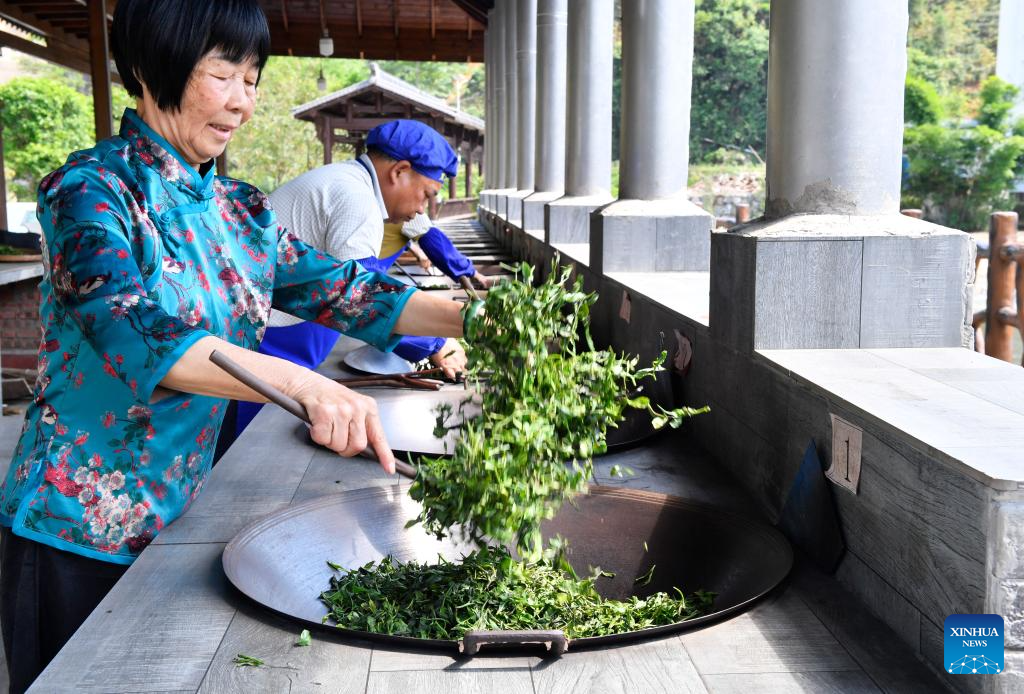
Tea master Wei Jiequn processes the tea leaves at a tea workshop in Liubao township of Cangwu county in Wuzhou, south China's Guangxi Zhuang Autonomous Region, May 16, 2024. Liubao tea, a Chinese dark tea characterized by its strong and lingering fragrance and medical effects, boasts a history of more than 1,500 years.
Famous for Liubao tea making, the city of Wuzhou has over 400,050 mu (about 26,670 hectares) of tea plantations, with an output value exceeding 20 billion yuan (about 2.8 billion dollars). (Xinhua/Jin Haoyuan)
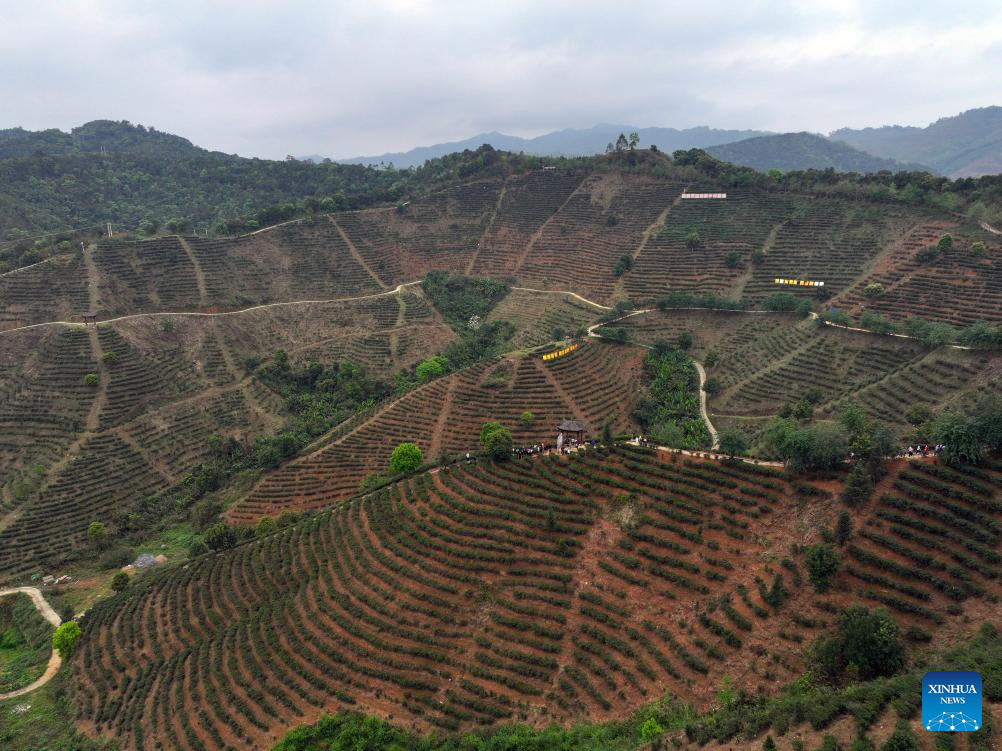
An aerial drone photo taken on March 26, 2024 shows tea garden in Liubao township of Cangwu county in Wuzhou, south China's Guangxi Zhuang Autonomous Region. Liubao tea, a Chinese dark tea characterized by its strong and lingering fragrance and medical effects, boasts a history of more than 1,500 years.
Famous for Liubao tea making, the city of Wuzhou has over 400,050 mu (about 26,670 hectares) of tea plantations, with an output value exceeding 20 billion yuan (about 2.8 billion dollars). (Xinhua/Huang Xiaobang)
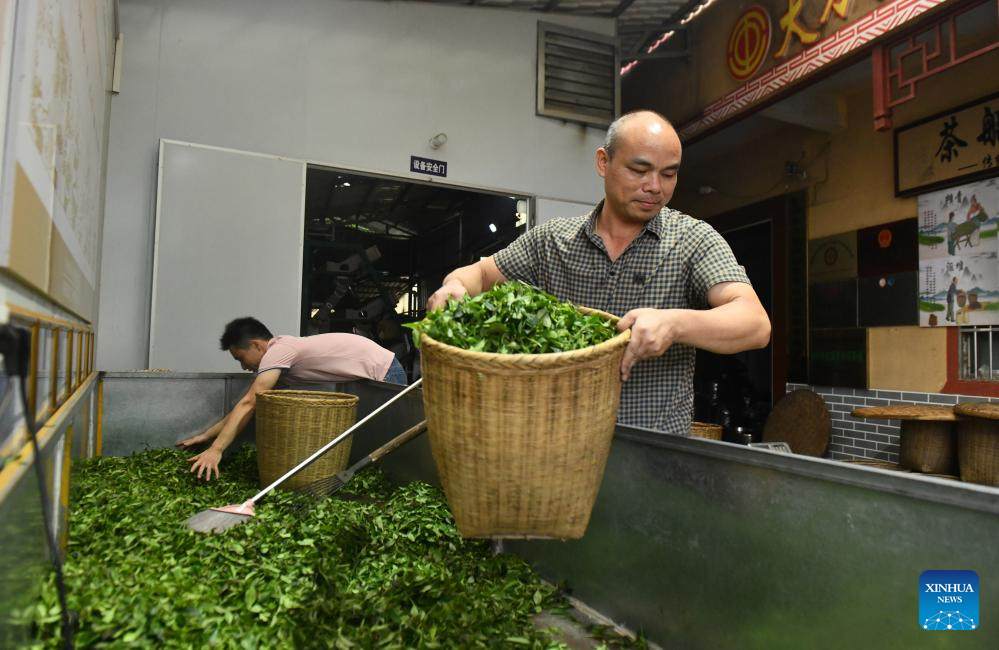
Local resident processes the tea leaves in Shanping village of Liubao township, in Cangwu county of Wuzhou, south China's Guangxi Zhuang Autonomous Region, Sept. 19, 2024. Liubao tea, a Chinese dark tea characterized by its strong and lingering fragrance and medical effects, boasts a history of more than 1,500 years.
Famous for Liubao tea making, the city of Wuzhou has over 400,050 mu (about 26,670 hectares) of tea plantations, with an output value exceeding 20 billion yuan (about 2.8 billion dollars). (Xinhua/Huang Xiaobang)
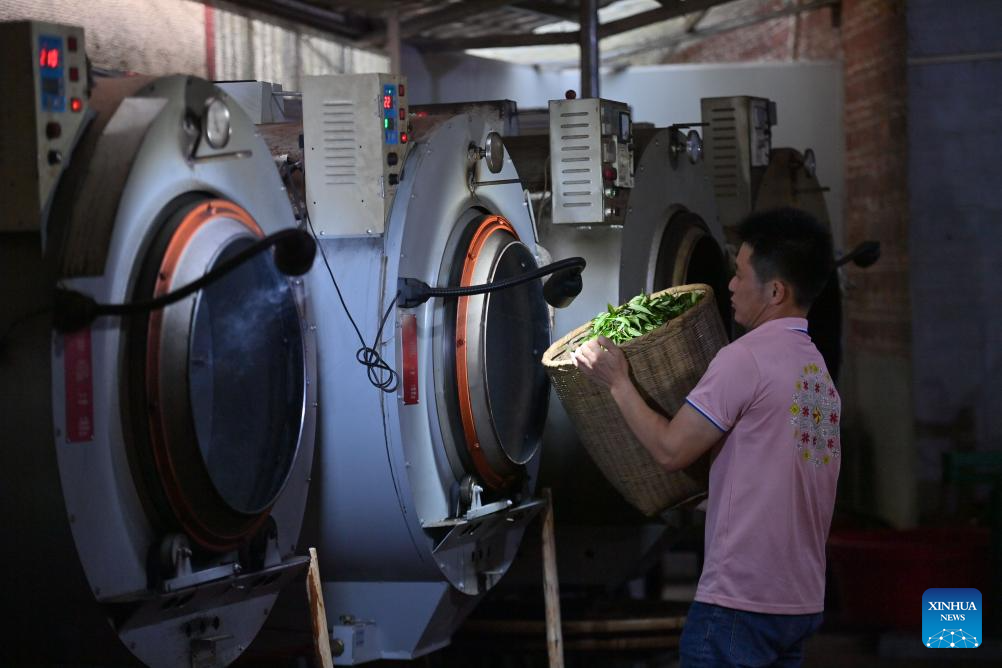
A local resident processes the tea leaves in Shanping village of Liubao township, in Cangwu county of Wuzhou, south China's Guangxi Zhuang Autonomous Region, Sept. 19, 2024. Liubao tea, a Chinese dark tea characterized by its strong and lingering fragrance and medical effects, boasts a history of more than 1,500 years.
Famous for Liubao tea making, the city of Wuzhou has over 400,050 mu (about 26,670 hectares) of tea plantations, with an output value exceeding 20 billion yuan (about 2.8 billion dollars). (Xinhua/Huang Xiaobang)
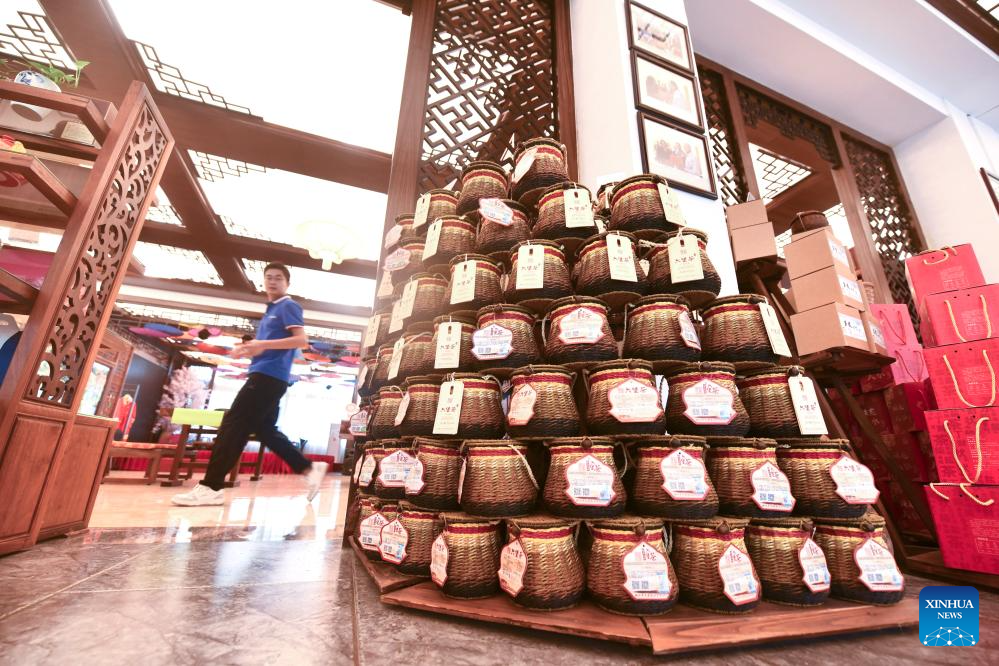
Liubao tea products are seen at a tea company in Wuzhou, south China's Guangxi Zhuang Autonomous Region, Oct. 25, 2024.
Liubao tea, a Chinese dark tea characterized by its strong and lingering fragrance and medical effects, boasts a history of more than 1,500 years.
Famous for Liubao tea making, the city of Wuzhou has over 400,050 mu (about 26,670 hectares) of tea plantations, with an output value exceeding 20 billion yuan (about 2.8 billion dollars). (Xinhua/Huang Xiaobang)
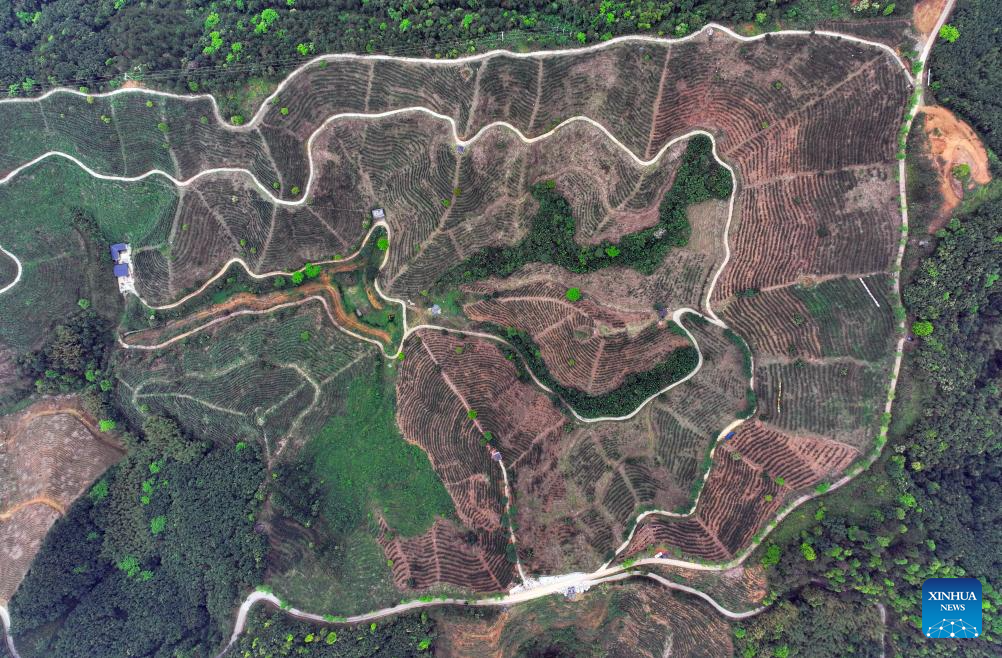
An aerial drone photo taken on March 26, 2024 shows tea garden in Liubao township of Cangwu county in Wuzhou, south China's Guangxi Zhuang Autonomous Region. Liubao tea, a Chinese dark tea characterized by its strong and lingering fragrance and medical effects, boasts a history of more than 1,500 years.
Famous for Liubao tea making, the city of Wuzhou has over 400,050 mu (about 26,670 hectares) of tea plantations, with an output value exceeding 20 billion yuan (about 2.8 billion dollars). (Xinhua/Huang Xiaobang)
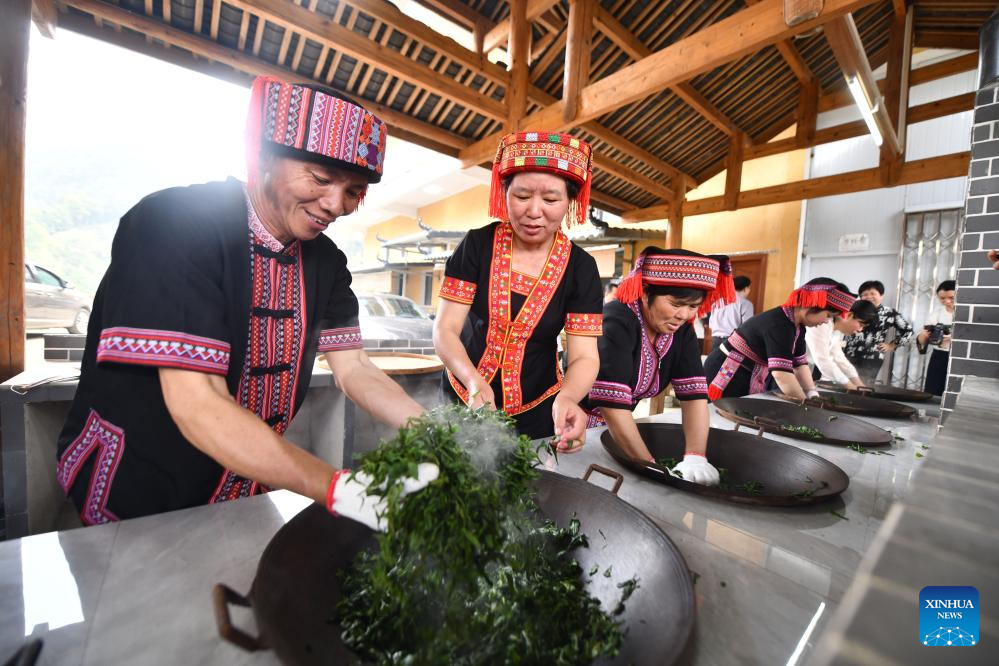
Local residents process the tea leaves in Shanping village of Liubao township, in Cangwu county of Wuzhou, south China's Guangxi Zhuang Autonomous Region, March 25, 2024. Liubao tea, a Chinese dark tea characterized by its strong and lingering fragrance and medical effects, boasts a history of more than 1,500 years.
Famous for Liubao tea making, the city of Wuzhou has over 400,050 mu (about 26,670 hectares) of tea plantations, with an output value exceeding 20 billion yuan (about 2.8 billion dollars). (Xinhua/Huang Xiaobang)
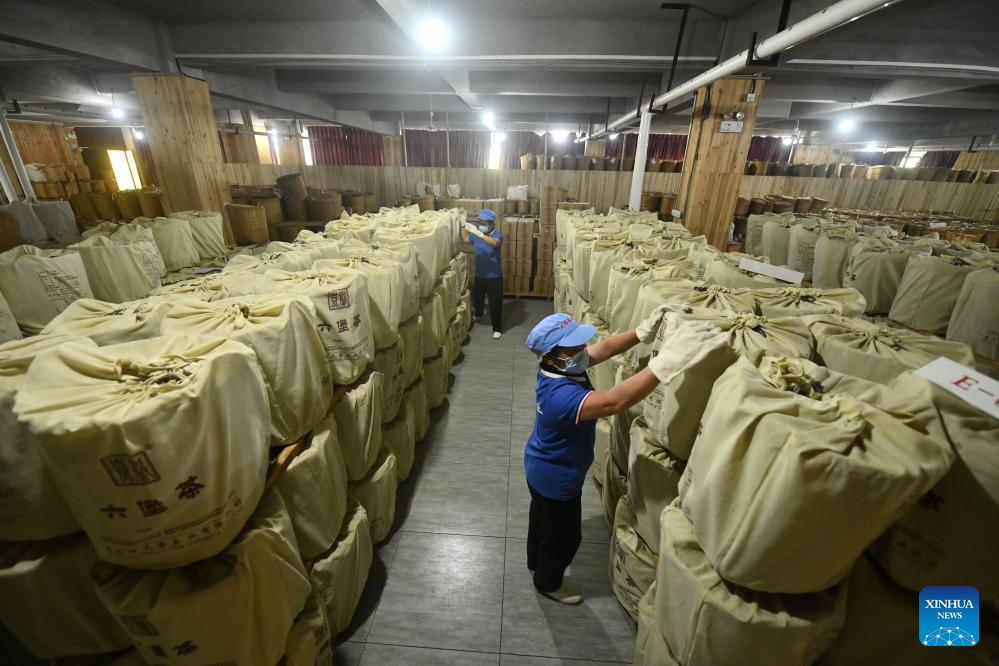
Workers store tea at a company in Wuzhou, south China's Guangxi Zhuang Autonomous Region, Oct. 25, 2024. Liubao tea, a Chinese dark tea characterized by its strong and lingering fragrance and medical effects, boasts a history of more than 1,500 years.
Famous for Liubao tea making, the city of Wuzhou has over 400,050 mu (about 26,670 hectares) of tea plantations, with an output value exceeding 20 billion yuan (about 2.8 billion dollars). (Xinhua/Huang Xiaobang)
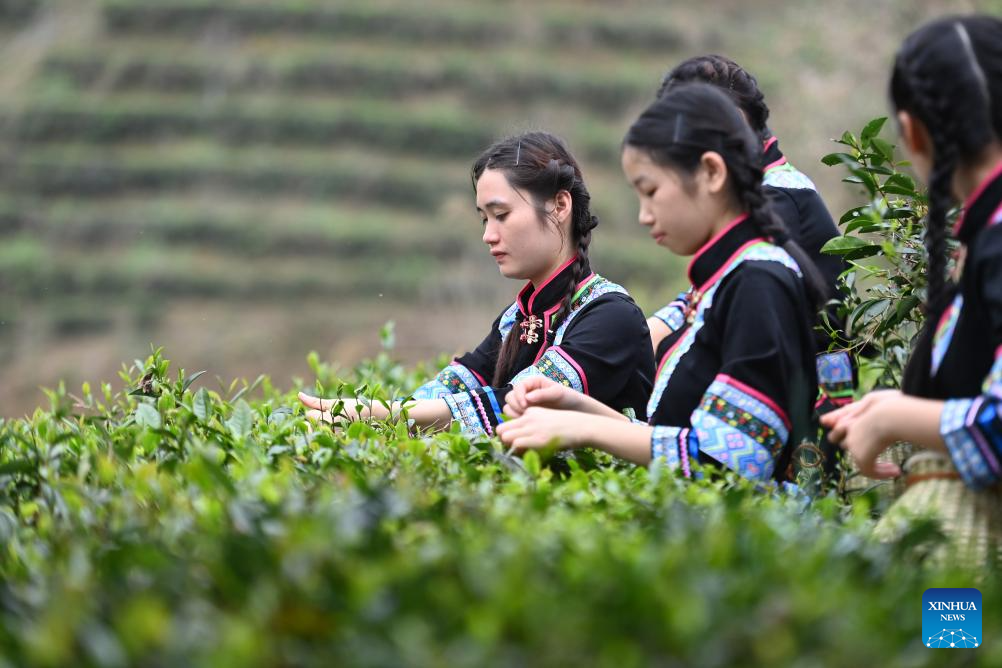
University students experience picking of the tea leaves in Shanping village of Liubao township, in Cangwu county of Wuzhou, south China's Guangxi Zhuang Autonomous Region, March 25, 2024. Liubao tea, a Chinese dark tea characterized by its strong and lingering fragrance and medical effects, boasts a history of more than 1,500 years.
Famous for Liubao tea making, the city of Wuzhou has over 400,050 mu (about 26,670 hectares) of tea plantations, with an output value exceeding 20 billion yuan (about 2.8 billion dollars). (Xinhua/Huang Xiaobang)
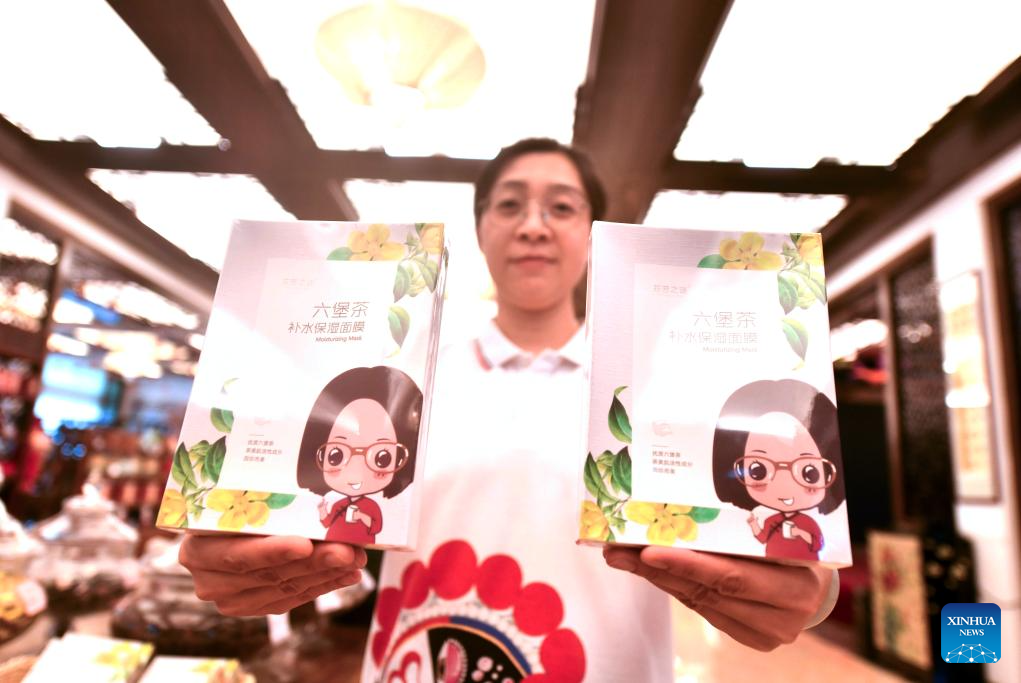
A staff member shows facial masks made from Liubao tea in Wuzhou, south China's Guangxi Zhuang Autonomous Region, Oct. 24, 2024. Liubao tea, a Chinese dark tea characterized by its strong and lingering fragrance and medical effects, boasts a history of more than 1,500 years.
Famous for Liubao tea making, the city of Wuzhou has over 400,050 mu (about 26,670 hectares) of tea plantations, with an output value exceeding 20 billion yuan (about 2.8 billion dollars). (Xinhua/Huang Xiaobang)
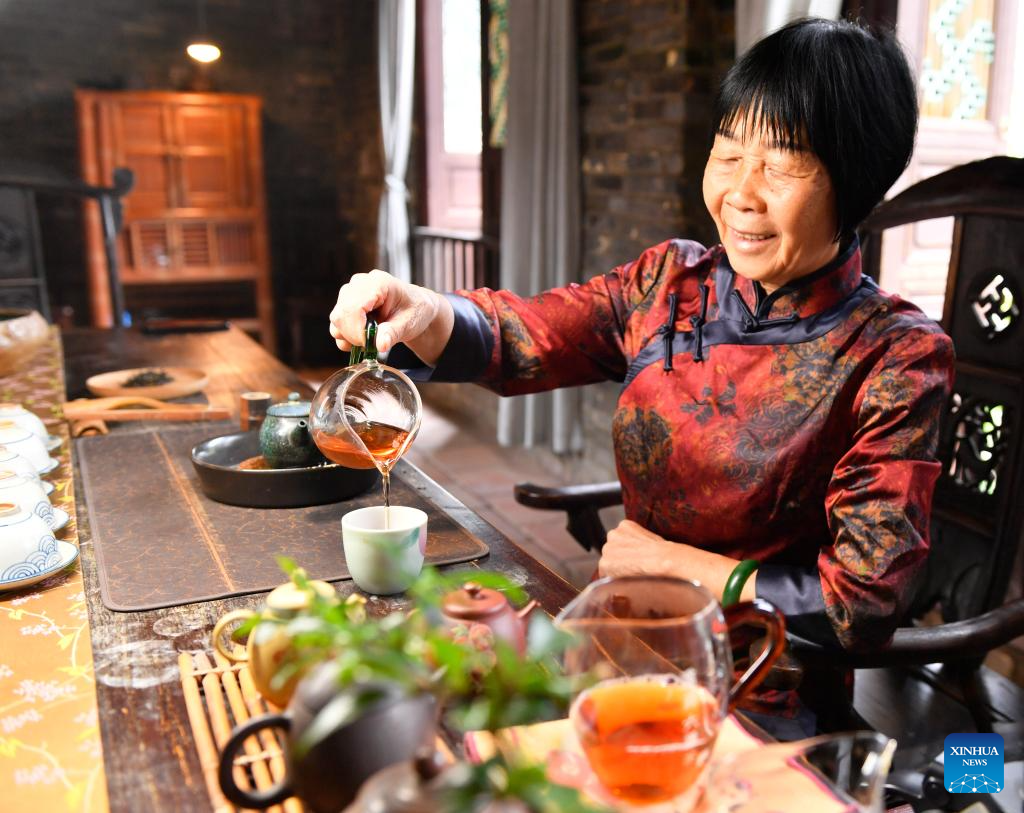
Tea master Wei Jiequn prepare to taste Liubao tea at a tea workshop in Liubao township of Cangwu county in Wuzhou, south China's Guangxi Zhuang Autonomous Region, May 17, 2024. Liubao tea, a Chinese dark tea characterized by its strong and lingering fragrance and medical effects, boasts a history of more than 1,500 years.
Famous for Liubao tea making, the city of Wuzhou has over 400,050 mu (about 26,670 hectares) of tea plantations, with an output value exceeding 20 billion yuan (about 2.8 billion dollars). (Xinhua/Jin Haoyuan)

Workers store tea at a company in Wuzhou, south China's Guangxi Zhuang Autonomous Region, Oct. 25, 2024. Liubao tea, a Chinese dark tea characterized by its strong and lingering fragrance and medical effects, boasts a history of more than 1,500 years.
Famous for Liubao tea making, the city of Wuzhou has over 400,050 mu (about 26,670 hectares) of tea plantations, with an output value exceeding 20 billion yuan (about 2.8 billion dollars). (Xinhua/Huang Xiaobang)
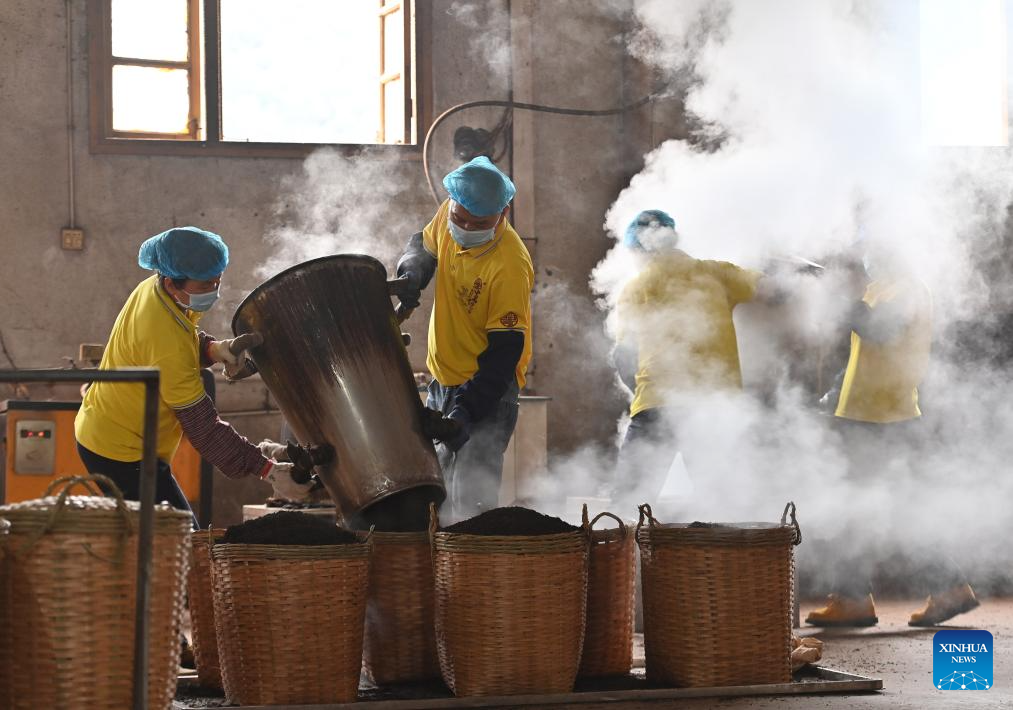
Workers process tea at a company in Wuzhou, south China's Guangxi Zhuang Autonomous Region, March 26, 2024. Liubao tea, a Chinese dark tea characterized by its strong and lingering fragrance and medical effects, boasts a history of more than 1,500 years.
Famous for Liubao tea making, the city of Wuzhou has over 400,050 mu (about 26,670 hectares) of tea plantations, with an output value exceeding 20 billion yuan (about 2.8 billion dollars). (Xinhua/Huang Xiaobang)
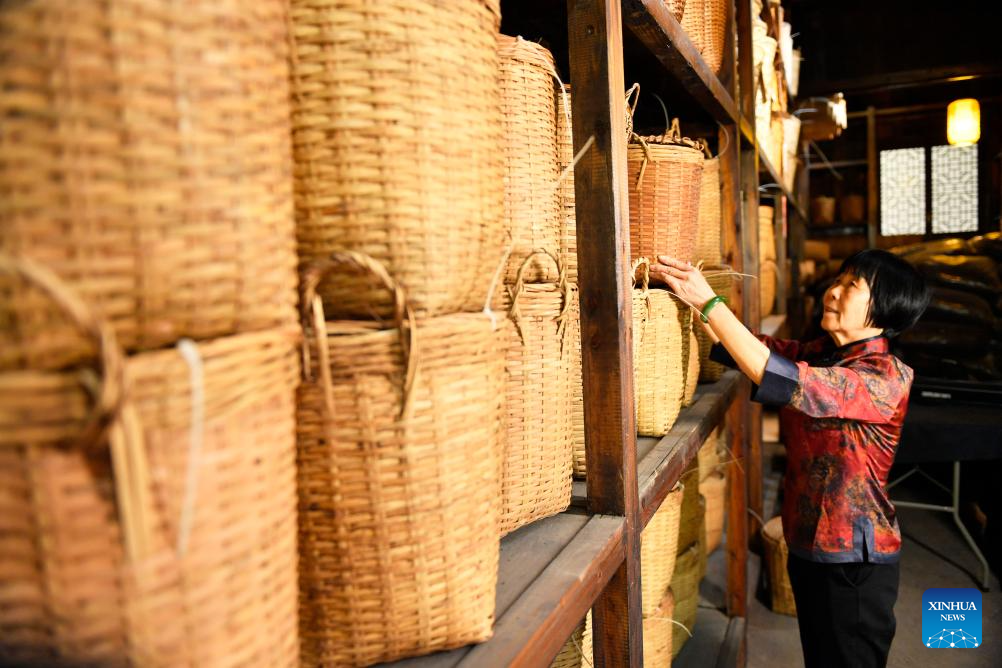
Tea master Wei Jiequn checks the storage of tea at a tea workshop in Liubao township of Cangwu county in Wuzhou, south China's Guangxi Zhuang Autonomous Region, May 17, 2024. Liubao tea, a Chinese dark tea characterized by its strong and lingering fragrance and medical effects, boasts a history of more than 1,500 years.
Famous for Liubao tea making, the city of Wuzhou has over 400,050 mu (about 26,670 hectares) of tea plantations, with an output value exceeding 20 billion yuan (about 2.8 billion dollars). (Xinhua/Jin Haoyuan)



